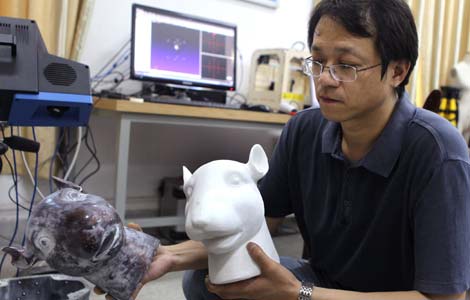Film industry needs long tail to grow
Updated: 2013-08-15 08:07
By Zhu Jin (China Daily)
|
||||||||
The domestic film market registered record half-yearly box office returns of 10.9 billion yuan ($1.77 billion) in the first six months of this year, up 35 percent year-on-year, and there have been excited voices saying that the Chinese film industry is about to boom in the international market. However, box office success is just part of the industry's chain, and without the further development of licensed movie merchandising, the Chinese film industry is still in the early stage of development compared to developed countries.
Movie merchandising refers to the spin-off products from a film, such as toys, audiovisual products, books, video games, souvenirs, clothes and even theme parks. Such merchandise is an indispensable part of the industry's value chain and manifests the long-tail retailing strategy of selling a large number of unique items in relatively small quantities.
The importance of such long-tail spin-off retailing for movies has been proven in developed film markets, such as the United States, where the box office usually accounts for only 22 percent of the total revenue generated by a film. The rest comes from non-theatrical releases and film-related products.
The most successful movie merchandiser is Walt Disney Studios. For instance, in 1994, the company invested $45 million to produce The Lion King, which took $780 million at the box office, while the revenue from spin-off products was more than $2 billion. The effectiveness of movie merchandise as a money-spinner was demonstrated by the original Star Wars trilogy in the late 1970s and 1980s. The films realized $1.8 billion at the box office, while the revenue from spin-off products exceeded $4.5 billion.
Movie merchandising has already become a mature and profitable channel in the film markets of developed countries. Usually, a popular Hollywood movie will authorize around 50 to 100 different products as licensed merchandise. The total sales revenues from such products reached $147 billion in 2010 worldwide, according to data from Licensing Letter. Therefore, the major film studios consider spin-off products as a crucial element in the pre-production stage.
However, this is still a relatively new concept in China, where box office returns account for more than 80 percent of a film's total revenues.
"The current Chinese film industry is experiencing a transformation period just like Hollywood did in 1950s and 1960s, breaking the film system into different specialized parts, like film production, distribution, marketing, research organizations and so on. So it is an opportunity to develop movie merchandising now," said Peng Kan, research and development director of Beijing-based consultation company Legend Media.
Although there is huge space for developing licensed movie merchandise, a few issues remain to be solved first.
At the moment even the most successful Chinese films fail to cash-in with spin-off products. Lost in Thailand, which took nearly 1.2 trillion yuan at the box office in 2012, promoted Chiang Mai as advertisements in the movie, however, besides those product placements in the film, there were no spin-off products to generate more revenue for the film.
Moreover, most domestic film companies lack the necessary talent to develop licensed merchandising strategies. There was a mask produced for Let the Bullets Fly, but the product was not well planned and sales of the mask did not contribute much to the films revenue. In Hollywood, film companies have specialized departments to manage licensed merchandise.
The pirating of products in the domestic market is also a reason for the slow development in movie spin-offs. In 2008, licensed merchandise was produced to accompany Stephen Chow's animated version of CJ7, however, the rapid growth of pirated CJ7 products squeezed the profits of the legal goods and effectively stunted the growth of movie merchandising in China. Tan Xiaofang, a marketing expert, says before movie merchandising can take off in the mainland, government policies and strengthened copyright practice are needed to fight pirated products.
The film industry in China should transform to a complete industrial chain and develop a better long-tail strategy for films to ensure the industry's future development.
The author is a writer with China Daily. zhujin@chinadaily.com.cn
(China Daily 08/15/2013 page8)

 Two killed in fiery crash of UPS cargo jet
Two killed in fiery crash of UPS cargo jet
 Special bus seat for breast-feeding mothers
Special bus seat for breast-feeding mothers
 Northern exposure
Northern exposure
 Re-enacting ancestors' journey to the west
Re-enacting ancestors' journey to the west
 Yao dreams of sports for fun with towering charity
Yao dreams of sports for fun with towering charity
 Protests arise in Taiwan over 'comfort women'
Protests arise in Taiwan over 'comfort women'
 Huawei unveil Ascend P6 smartphone in Vienna
Huawei unveil Ascend P6 smartphone in Vienna
 When small is beautiful in hotel industry
When small is beautiful in hotel industry
Most Viewed
Editor's Picks

|

|

|

|

|

|
Today's Top News
Over 200 dead after Egypt forces crush protesters
2 killed in crash of UPS cargo jet
China to probe foreign automakers
Watchdog to protect rights of consumers
Sizzling summer tops the record list
Egypt declares monthlong state of emergency
Typhoon makes landfall in S China
UN seek private firms' help in curbing HIV/AIDS
US Weekly

|

|





